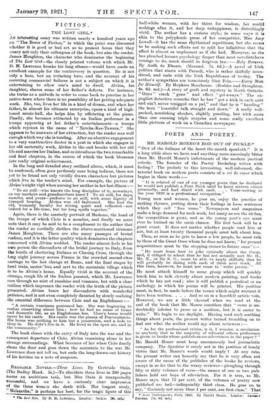READABLE NOVELS.—Three Lives. By Gertrude Stein. (The Bodley Head. 5s.)—To
elucidate three lives in 280 pages seems an ambitious task, but Miss Stein is unexpectedly successful, and we have a curiously clear impression of the three woman she deals with. Her longest study, "Bitganotha," is perhaps her best,' for the tragic figure of this • TA' Last Girl. By D. U. Lawrence. London: Seek:J. I9a. net.] half-white woman, with her thirst for wisdom, her sordid seekings after it, and her deep unhappiness, is disturbingly vivid. The author has a curious style; in some ways it is akin to the polyphonic prose of her compatriot, Miss Amy Lowell—it has the same rhythmical repetitions, but she seems to be making such efforts not to split her infinitives that the effect is almost as unpleasant as if she had. However, as she has plumbed human psychology deeper than most novelists have courage to do, much should be forgiven her.—Holy Romans. By Aodh de Blacan. (Maunsel. 7s. 6d.)—A novel of Irish politics that starts with Parnell, who is rather skilfully intro- duced, and ends with the Irish Republicans of to-day. The author's sympathies are tenaciously Sinn Fein.—Every Man for Himself. By Hopkins Moorhouse. (Hodder and Stoughton. Se. ed. net.)—A story of graft and mystery in North Ontario. " Guys " crack " guns " and effect " get-aways." The ex- pugilist detective remarks that he has " got a kick in each mitt and ain't never renigged on a pal," and that he is " handing " the hero " beautiful talk straight and down." A really well- packed, nourishing shocker, slightly puzzling, but with more than one cunning triple surprise and some really excellent little pictures of work on a Canadian newspaper.


































 Previous page
Previous page